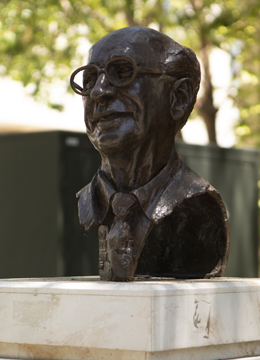- Milton Friedman
Critical Essay By
Dr. James L. Doti
President Emeritus and Professor of Economics
Argyros School of Business and Economics
View Bio
I’ll never forget attending an economic presentation as a student at the University of Chicago where a visiting economist presented an incomprehensible paper that relied exclusively on mathematical equations. No one, including me, understood enough about the presentation to ask even one intelligent question, except for one of the professors in attendance - Milton Friedman. He raised his hand and said something along the following lines. “I didn’t quite follow all the math, but it seems to me your conclusion is exactly the opposite of what it should be.” In rechecking his math, the visiting economist discovered he had made a sign error that confirmed Friedman’s suspicion was indeed correct.
Another time I recall accompanying Friedman to John Wayne Airport following a visit he made to Chapman University. As we approached the gate, he stopped and stared for an unusually long time at the arrival and departure boards. When I pointed out his departure time, he said he wasn’t interested in that. He was simply trying to figure out why John Wayne Airport used a different way of displaying the flight information. As he gave an attendant his ticket and embarked on the plane, I could see he was still distracted by trying to figure out why John Wayne’s display system was different.
It is this kind of inquisitive mind, even for seemingly insignificant things, that helps give Friedman an incredibly astute understanding of our economy and how it works. Like the great Adam Smith of “Wealth of Nations” before him, Friedman’s observations led him to conclude that there is a harmonious order where the natural and almost instinctive urges and desires of individuals are channeled into the interests of society. This channeling, he concluded, is best done through competitive private markets rather than through laws or governmental edicts.
The central theme that the market economy is much more effective in promoting freedom, prosperity, and equality than centrally controlled mechanisms that rely on bureaucratic decision-making occurs throughout Friedman’s work and writings.
In the classic work, “The Monetary History of the United States 1867-1960,” Friedman and Anna Schwartz presented compelling empirical evidence that the Great Depression was caused not by a failure of the free-market economy but rather by flawed government policies.
In the 1950s, a period in which Keynesian economics was becoming an increasingly dominant economic philosophy, Friedman wrote “A Theory of the Consumption Function.” This path-breaking study, which measured peoples’ consumption patterns, ultimately showed that Keynesian governmental fiscal policies were not necessary for a healthy economy. Although many of the ideas Friedman included in “Capitalism and Freedom” in 1962 were considered by many to be heretical at the time, most of his proposals have since been adopted. These proposals included all-volunteer armed forces, flexible exchange rates, and significantly lower marginal tax rates.
Another of Friedman’s proposals in “Capitalism and Freedom,” one that has become a passion for him, is the establishment of tuition vouchers. His strong advocacy is reflected in the creation of the Milton and Rose D. Friedman Foundation for Educational Choice, founded with a mission to promote understanding of the need for major reform in K-12 education and the role that competition through educational choice can play in achieving that reform.
In the early 1980s, Friedman’s “Free to Choose” became one of PBS’ most viewed video series. It also attracted large audiences abroad, including communist countries where it reportedly was being smuggled. The book that accompanied the video series was a bestseller and was translated into 17 languages. In commenting on his and his wife, Rose’s global travels, Friedman identified a central theme of “Free to Choose.”
“Wherever we found any large element of individual freedom, some beauty in the ordinary life of the ordinary man, some measure of real progress in the material comforts at his disposal, and a life hope of further progress in the future - there we also found that the private market was the main device being used to organize economic activity. Wherever the private market was largely suppressed, and the state undertook to control in detail the economic activity of its citizens ... there the ordinary man was in political fetters, had a low standard of living, and was largely bereft of any conception of controlling his own destiny.”
The growing realization of the truth behind this idea was, arguably, the most important factor explaining the fall of the Berlin Wall. It also explains why Jim Powell, in his recent book, “The Triumph of Liberty,” describes Milton Friedman as an intellectual leader who “ranks as the greatest champion of liberty during the 20th century.”
Perhaps my fondest memory of my graduate studies at the University of Chicago was the day it was announced that Milton Friedman received the Nobel Prize in Economics. As he walked into class for his lecture, I was proud to join my fellow students in giving Professor Friedman a standing ovation.
